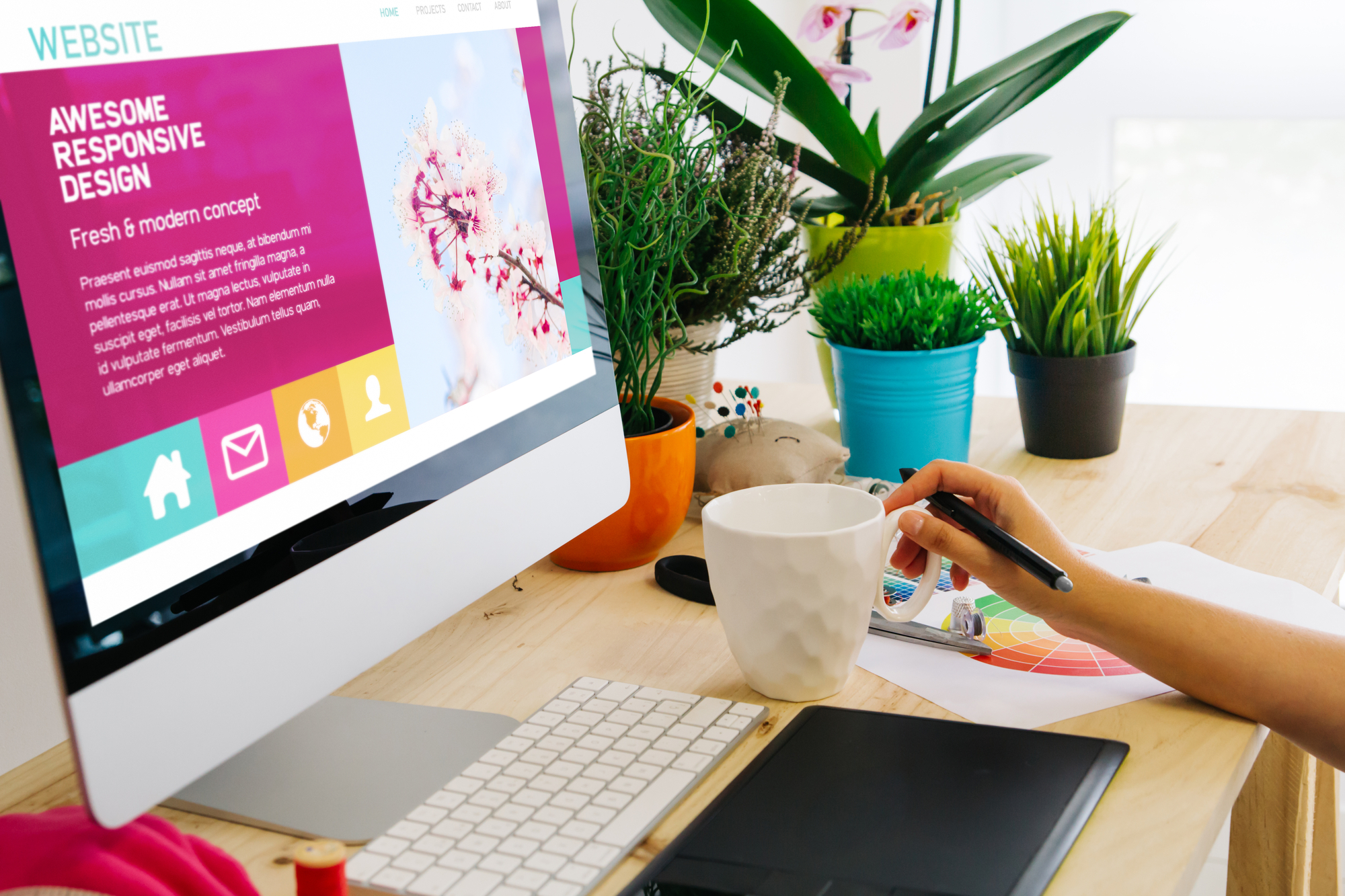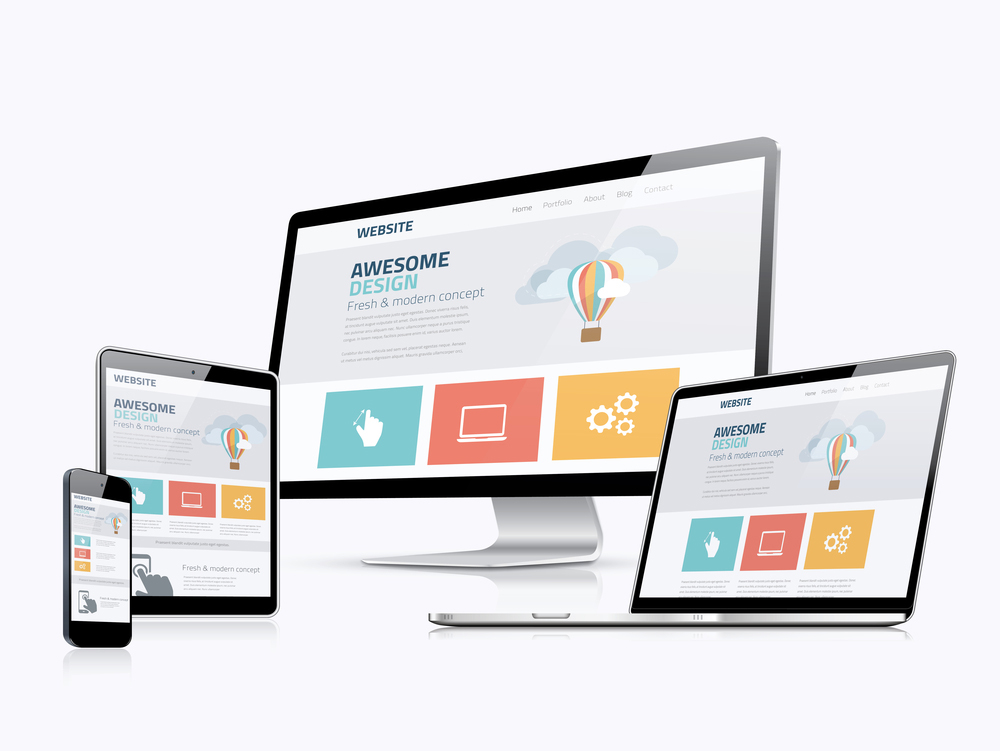Get Inspired With These Best Web Design Guidelines
The internet has become a crowded marketplace, with businesses of all shapes and sizes vying for the attention of online consumers. In this...
6 min read
 Bill Walls
:
Jun 29, 2023 3:35:02 PM
Bill Walls
:
Jun 29, 2023 3:35:02 PM

Is your business still stuck in the digital stone age with an outdated website? It’s time to break free from the clutches of an online presence that’s gathering virtual dust.
In today’s fast-paced digital world, your website is your first interaction with many customers. If your web design looks like a relic from the past, you’re missing out on countless opportunities to make a great first impression.
Yet many business owners often struggle with whether to have a custom web design or to use an existing template.
As you weigh your two options, it’s important to keep in mind that revamping your business website isn’t just about a fresh new look. It’s a strategic move that will ripple through multiple areas of your business, from bolstering brand credibility to attracting new customers and boosting revenue.
Custom web design is the process of creating a website from scratch. Your site is tailored specifically to meet the unique needs and requirements of your business. It involves designing and developing every aspect of the website, including layout, visual elements, functionality and user experience.
Incorporating a custom web design into your marketing plan can have many advantages for your company.
Custom web design allows businesses to have full control over the design and functionality of their website. It can be customized to align with the brand identity, target audience and specific revenue goals. This level of customization ensures that the website effectively communicates the desired message and provides a seamless user experience.
By offering a unique and distinctive online presence, you can set your business apart from your competitors. Design elements, color schemes, typography and overall aesthetics can be carefully crafted to reflect the brand’s personality, values and mission. This uniqueness helps in building brand recognition and establishing a strong online presence.
As your business grows, you may require more flexibility in how your site is designed as well as how it operates. A website can be built to accommodate future expansions, additional features and changing business needs. With custom design, businesses have the freedom to incorporate innovative functionalities and stay ahead of the competition as well.
Custom web design enables businesses to prioritize user experience, which studies show result in higher engagement and conversions. The website can be optimized for intuitive navigation, fast load times and seamless browsing across different devices. By considering user preferences and behavior, custom design ensures a user-friendly interface that encourages visitors to stay longer and explore further.
On the other hand, customizing your business’s web design can have a few disadvantages, especially for small business owners with limited time and budgets.
Custom web design is typically more expensive than using pre-designed templates. It involves hiring skilled web designers and developers, which can incur higher upfront costs. Additionally, the process of designing, developing and testing a custom website is time-consuming and may extend the project timeline.
Creating a custom website requires technical expertise in web design, coding languages and content management systems (CMS). Businesses without an in-house team may need to outsource the project, increasing the need for effective communication and collaboration with the external team.
With custom web design, ongoing maintenance and updates can be more complex compared to using templates. As technologies evolve and security vulnerabilities emerge, a website needs regular monitoring, bug fixing and updates. This requires technical knowledge or the engagement of web developers to ensure the website remains secure and fully functional.
Template-based web design involves using pre-designed website templates that can be purchased or obtained from various sources. These templates come with pre-built layouts and design elements, and often include basic functionalities. Businesses can customize these templates by adding their content, images and branding elements.
sources. These templates come with pre-built layouts and design elements, and often include basic functionalities. Businesses can customize these templates by adding their content, images and branding elements.
Web designs that use templates can be an attractive option for business owners who have limited time and money to spend on this important component of their business’s identity.
One of the primary advantages of template-based web design is its cost-effectiveness and time efficiency. Templates are generally more affordable compared to custom web design since they eliminate the need for extensive design and development from scratch. They are readily available and can be quickly implemented, reducing the time it takes to launch a website.
Website templates are designed with user-friendliness in mind, allowing businesses with limited technical knowledge to create a professional-looking website. Most templates offer intuitive drag-and-drop functionality or user-friendly interfaces, making it easy to customize and add content. The simplicity of templates ensures a smoother and faster website development process.
There are templates available for different industries, styles and purposes, allowing businesses to find a design that closely aligns with their branding and target audience. This variety ensures that businesses can create visually appealing websites without the need for extensive design skills.
Template providers often offer regular updates and support, ensuring that the templates remain compatible with the latest web standards and technologies. This ongoing support helps businesses stay up to date with design trends, security patches and bug fixes without the need for extensive technical knowledge or additional costs.
While there are several advantages to using a template for your web design, there are many key disadvantages that could make a business owner think twice about using this option for their brand identity.
While templates offer some level of customization, businesses may find limitations in terms of design flexibility and functionality. Templates often follow predefined structures and layouts, making it challenging to create a completely unique design that perfectly aligns with the brand identity and specific requirements of the business.
Since templates are available to multiple users, there is a risk of having similar-looking websites across different businesses. This can result in a lack of distinctive branding and a generic online presence, potentially impacting the ability to stand out in a competitive market. Customization options may not fully address the need for a unique and memorable brand identity.
Templates are accessible to a wide range of users, which means that multiple websites may end up using the same template. This can dilute the uniqueness and originality of a business's online presence. It's essential to carefully select templates and customize them to differentiate the website as much as possible.
Customizing your website and using a template both have their advantages and disadvantages. While using a template can be less expensive up front and less time consuming, it doesn’t always offer you the opportunity to set your brand apart. As your business grows, a template design can also feel constricting … limiting your ability to evolve your website as your business evolves as well.
When weighing your two options, here are some factors to consider in choosing the right approach for your business.
Custom web design generally requires a larger investment compared to template-based options up front. Up front is key, though. It’s also important to consider the long-term value and potential return on investment (ROI) when making budgetary decisions.
Assess the importance of a unique and distinctive brand identity for the business. Custom web design allows for tailored branding elements, while templates may offer limited options. Determine how crucial it is to stand out from competitors in terms of visual branding.
Determine the specific functionalities and features required for the website. Custom web design offers more flexibility in terms of incorporating advanced functionalities and scaling the website as the business grows. Evaluate whether these capabilities are critical for achieving business goals.
Consider the timeline for launching the website. Custom web design typically requires more time due to the design and development process, but template-based designs can be implemented quickly. Consider whether there are any urgent time constraints or project deadlines that could influence the choice of approach.
Evaluate the technical expertise within the business or the availability of resources for web design. Custom web design often requires skilled professionals or external agencies, whereas template-based designs can be handled by individuals with limited technical knowledge. Assess the capabilities and resources available before making a decision.
It’s important to determine the level of technical expertise available to handle maintenance tasks and the overall maintenance budget. If you opt for a template, you may not have that built-in support that you would have if you have your website custom designed by a web developer or marketing agency.
A web design company can play a crucial role in helping your business establish a strong online presence and achieve its digital goals. As an important marketing tool, your website should be designed to focus on the customers’ problems with solutions your business can provide.
The best web design company will look at your business as more than just a client or your website as more than just a design project. As a business itself, the web design company should know an effective website is key to growing your business and should treat the design of your site as an important part of implementing an effective marketing plan.
When done correctly, a website design can make a significant difference in how you attract visitors and convert them into qualified leads for your sales team.
That’s why choosing an experienced marketing agency is key to getting the most out of your website design.
The best web design company will:
It’s important to remember that the best website design company won’t simply design your site and move onto the next project. The best agencies incorporate the website into a comprehensive marketing plan that offers a holistic perspective.
If you …
Then you …
Need a marketing company that views your website as an extension of your business and is prepared to help you meet your growth goals.

The internet has become a crowded marketplace, with businesses of all shapes and sizes vying for the attention of online consumers. In this...

Let’s face it … we live in a world where it’s much easier to pull out your iPhone or tablet to search for a product or service that you need.

With so many web design companies ready to give your business a presence online, it can be overwhelming to choose the right fit for you.